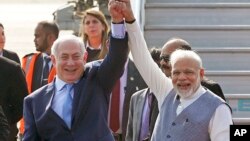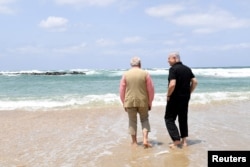The prime ministers of India and Israel reaffirmed their rapidly warming ties and spoke of the “dawn of a new era” Monday as the two nations signed agreements spanning areas such as defense, agriculture, energy and trade following talks in New Delhi.
Israel's Benjamin Netanyahu arrived in the Indian capital Sunday, six months after his Indian counterpart, Narendra Modi, set the foundation for an upward swing in ties when he dropped decades of caution and became the first Indian prime minister to visit Israel.
“We are ushering in a new era in relations now,” said Netanyahu at a joint news conference. “We have had diplomatic relations for 25 years, but something different is happening now.”
Modi greeted the Israeli prime minister in Hebrew, saying, “My good friend welcome to India” and stressed that their discussions were marked “by the desire to do more” and "scale up the partnership."
The bonhomie between the two leaders at the press conference underlined that India’s vote in favor of a United Nations resolution opposing the U.S. recognition of Jerusalem as Israel’s capital has not derailed the momentum of ties.
Modi called on Israeli defense firms to invest in India following liberalized rules for foreign investment. India's decision to cancel a $500 million anti-tank missiles deal with Israel earlier this month was not mentioned.
Although the sale of weapons has been a cornerstone of the relationship and Israel is emerging as one of India’s major defense suppliers, both leaders said that cooperation in areas such as agriculture, science and technology and security are the new priorities. New Delhi is seeking Israeli expertise to boost farm production and improve water management.
“From July [when Modi visited Israel] onwards, the soft issues are the prime focus. These are economic in nature, non-political and development oriented,” says P.R. Kumaraswamy, professor of Middle Eastern studies at New Delhi’s Jawaharlal Nehru University. “Issues like agriculture, water management, horticulture, desalination, all these are the issues which are going to dominate the Indo-Israel relations.”
The agreements signed on Monday included less explored areas such as oil and gas, cyber security and film production.
Accompanying Prime Minister Netanyahu is the largest ever business delegation to travel with an Israeli leader, underlining that India's growing economy presents new opportunities for the country. The 130 executives represent areas such as technology, agriculture and defense.
While Modi’s July visit to Israel set the “big picture” for their ties, the Israeli leader’s visit is about putting in place “the nuts and bolts,” said Kumaraswamy.
Bilateral trade between the two countries has risen from $200 million when they established diplomatic relations in 2002 to $4 billion.
Modi, who has made expanding ties with Israel a priority, broke protocol on Sunday to receive Netanyahu at the airport. Both leaders then visited a memorial to Indian soldiers who fought in World War I to help liberate the Israeli city of Haifa.
During his six-day visit, Netanyahu will visit Agra, home to the famous Taj Mahal monument. He is also scheduled to visit Modi’s home state of Gujarat and India’s financial capital, Mumbai, in the state of Maharashtra.
In Mumbai, Netanyahu will visit a Jewish center that was one of the targets during the 2008 terror strikes in the city. He will be accompanied by 11-year-old Moshe Holtzberg, who was saved by his nanny when he was a baby after his parents were killed in that attack.
"We remember the horrific savagery in Mumbai. We grit our teeth. We fight back, we never give in," Netanyahu said, underlining the two countries' shared concerns about terrorism.





